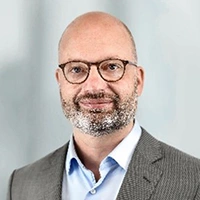
TROIA 1
Summary
The project TROIA 1 – Tactile Robotics in the Work Environment 1 (Medicine and Care) contributed to a sustainable securing of skilled labour in the healthcare sector in Lower Saxony by developing and testing robotics training courses for healthcare professionals, trainees and students based on the results of the Robonatives Initiative and by establishing a “Robonatives Network” for the healthcare sector.

Goals
The TROIA 1 project comprised the following components:
Building block A:
Identification of needs of the different target groups in the health sector.
Building block B:
Establishment of a “Robonative Network” for the health sector and integration into the nationwide network of the Robokind Foundation.
Building block C:
Development and testing of target group-specific modules.
Building block D:
Sensitisation of decision-makers for the inclusion of robotics in the curricular teaching of medical and nursing professionals.
Project duration: 01.12.2021 bis 31.12.2022
Target groups
Three target groups were to be reached in the project:
1. medical and nursing professionals
2. medical and nursing trainees
3. students of human medicine
Advisory Board of the TROIA 1 Project

Juliane Annussek (M.A. Erwachsenenbildung)
Hanover Medical School (MHH)
Head of Academy and Managing Director of the Academy of Nursing Education Surgical Count Support
“As the academy director of the MHH’s nursing training academy with its various training and further education programmes for health care professions, it is important to me to raise awareness of the use and potential of tactile robotics in the medical and nursing work environment, not only during training but also in corresponding further education and training courses. The TROIA project seems to me to be the right way to do this.

Dirk Engelmann
TK
Head of the TK Regional Office in Lower Saxony
“The Robonative Future of today is the everyday work in the health professions of tomorrow. That’s why I’m happy to get involved in the advisory board of the TROIA 1 project with my company’s technician spirit, in order to open up new perspectives for securing skilled workers, with which training and further education in medical and nursing professions can be made more future-proof on the one hand and even more exciting on the other.”
Dirk Engelmann has been Head of the TK Regional Office in Lower Saxony since November 2020. Before that, the political science graduate headed the staff of Hamburg’s health senator Cornelia Prüfer-Storcks since 2014. Through this function, he is familiar with a wide range of health policy issues at federal and state level and has been involved in all health policy reforms since that time, as Hamburg has taken on a coordinating role in the Federal Council. Dirk Engelmann has been at home in health policy since 2005, before the Hamburg station at federal level in Berlin, and has since then repeatedly dealt with issues of digitalisation.

Florian Fischbock
KRH Academy
Director
“Robotics in healthcare is a topic that will play an important role in shaping the healthcare of the future in a forward-looking and innovative way and is already doing so. Tactile robotics is not intended to replace humans, but rather to support good work with people and thus make an important contribution to patient-oriented care. It is extremely important to identify areas of application at an early stage, to reduce reservations and to understand possible uses.”
Florian Fischbock is the director of the KRH Academy, a board member of the Federal Association of Teachers of Health and Social Professions Lower Saxony/Bremen and a board member of the Federal Association of Schools for Anaesthesia Technical Assistance. At the KRH Academy, he is responsible for the training of more than 800 trainees and more than 120 continuing education places, as well as almost 4000 annual continuing education places in the health care sector. For more than 20 years, Mr Fischbock has been committed to the development and expansion of good care practice and teaching in the professional areas of hospital care. Mr Fischbock is 42 years old and a trained nurse, qualified nursing pedagogue and education manager (M.A.). At the KRH Academy, a training centre called “SkillsLAB Clinic Landscape”, which is unique in Germany, is currently being developed on almost 800 square metres, which will enable interdisciplinary and interprofessional training. This will also include an important focus on raising awareness and dealing with robotics.

Andreas May
Lower Saxony Ministry of Science and Culture in Department 14
Employee
“AI and robotics have the potential to decisively advance health and care. In addition to application-oriented research and a wide range of transfer and translation activities, the education, training and continuing education of professionals is of great importance in order to reliably and regularly transfer new findings on methods and procedures into health and care practice. TROIA 1 promises to noticeably accelerate this process.”
Andreas May works in the Lower Saxony Ministry of Science and Culture in Department 14 (Life Sciences, Humanities and Social Sciences; Academic Libraries).

Jörg Michal
Ministry of Education and Cultural Affairs of Lower Saxony
Employee
“I am happy to participate in the project TROIA 1 – Tactile Robotics in the Work Environment 1 (Medicine and Care), on the one hand to bring in the perspective of vocational education and on the other hand to explore a possible transfer of the results of the project to vocational schools.”
Jörg Michal works in the Lower Saxony Ministry of Education and Cultural Affairs in Department 43, which is responsible for the task of digitising BBS in Department 4, Vocational Education and Training, in the Lower Saxony Ministry of Education and Cultural Affairs.
Survey “Robotics in the healthcare sector
In order to design our educational offers according to the requirements of the target groups, we would like to record the need for educational offers with this survey.
https://www.surveymonkey.de/r/6WXZGLH
Results of our survey on robotics in healthcare:
https://robokind.de/wp-content/uploads/2023/Robotik_im_Gesundheitswesen.pdf